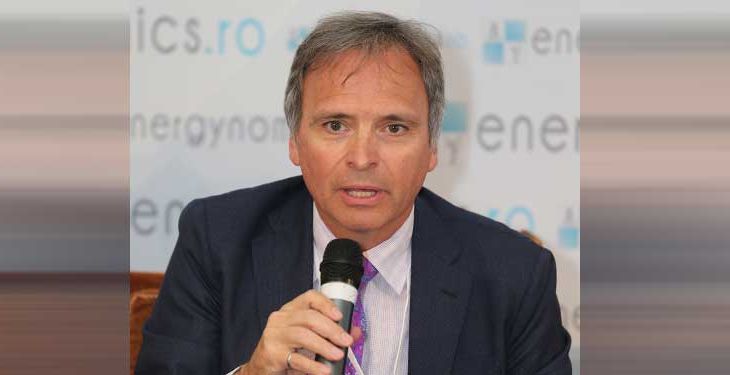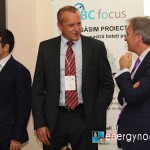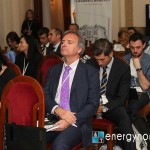This is the transcript of the message delivered by Mark Beacom, CEO of Black Sea Oil & Gas, and Vice-Chairman of RBSTA, during the 2016 Energy Strategy Summit, held on May 31 at Snagov Palace. For a sum-up of the main ideas, check our previous material: 27 essential ideas after Energy Strategy Summit 2016.
Good afternoon, everyone,
I am the CEO of Black Sea Oil & Gas and also the Vice Chairman of RBSTA, which is the association for the oil and gas companies offshore in Romania, and includes in addition to our company Black Sea Oil & Gas; ExxonMobil, OMV Petrom, Romgaz, Lukoil Overseas, Gas Plus International, and Petro Ventures.
This panel is about energy security and I’d like to make a very bold statement: as a country, if you want energy security, you should produce the energy yourself. That’s the most secure way to have energy supply. There are some other benefits of producing energy yourself, that is, for gas for instance, as much as you consume gas in Romania, you would much prefer that the taxes and royalties go to the Romanian Government, rather than go to a foreign government. And this is also true for employment and investment. It is better that employment and investment is in Romania, rather than consume gas in Romania and have these benefits go to another country.
Looking at the Black Sea and determining to what extent it can provide energy security for Romania, we’ve heard it today that the Black Sea has potential. There have been discoveries made, but, unfortunately to date – in fact, for over 30 years now – there is yet to be a commercial discovery announced in the Black Sea. And that is not necessary uncommon. All around the world there are discoveries that have been made that have not been produced for ten or twenty years, and they may never be produced. And the reason for that is basically threefold. There are three reasons why a discovery can be made and never produced.
The first is technological difficulties. The technology is so difficult – whether it is the deep sea, or the type of reservoir, or the amount of facilities that have to be built – that the investment is not viable. So, technology is one, the next are regulatory blockages, and the third is just poor investment grade. Those are the three things that stand in the way for having discoveries made available for production. Unfortunately, the story in the Romanian Black Sea is all three are a challenge. As far as technology is concerned, the reality is that in the shallower water, the reserves just tend to be very small. But there are still requirements to go over 100 kilometers offshore, drill wells offshore, build platforms offshore, build 140-150 kilometers of pipeline, build the facilities onshore, and so that is very difficult. For the deep waters, everything becomes just so much more difficult. The technology that is required is more severe, and the costs are more severe. The reserves are bigger, but so are the challenges.
As far as regulatory blockages are concerned, this is a real issue in the Black Sea, in Romania. The reality is that currently there is not a legal basis that allows a producer in the Romanian offshore to develop a field into the country of Romania. There is not a legal basis to do that! Ironically, there is a legal basis to take a Romanian discovery and develop it into Bulgaria, but I don’t think that is the optimal way to develop Romanian resources. And the issue we face with the regulatory blockages is not a matter of understanding what the issue is, or trying to persuade the regulatory authorities.
In fact, we have had very good support, particularly from ANRM, and Mr. Sorin Gal in particular, understanding the issues and trying to unblock them. We have had good support from the Ministry of Environment, from the Ministry of Energy, we have had good support from the last Government that was in power, and we have had good support on trying to unblock these issues with the current Government. Our problem is execution. Although everyone agrees and it seems like a fairly obvious solution, at least to get worked on, it just never seems to get resolved. And for us, as an investor in the Black Sea, if we can’t produce, then we can’t invest. That is the issue with the regulatory blockages.
The third one I mentioned that interferes with the ability to develop the Black Sea and create energy security is the investment grade. Basically, when we have come to the point that we are ready to actually develop, to build those facilities, we will have to – like every other company – we will have to go to the investment committee and explain the entire project, and they will look at all the risks. And one of the risks that really is a red flag that causes a big concern with investors is if the fiscal stability isn’t there in a country, if the fiscal rules are changing. And particularly it does not go down well if those rules are changing after the investor has come in, has agreed certain fiscal regime, has spent significant amounts of money, and then is threatened that the fiscal regime would change. It is very significant because it puts all of those developments at material risk.
One of the things, other than just the principle of stability, that I would hope maybe come out from the national energy strategy, is actually how we look at the health of the oil and gas industry in Romania. There is a narrative that this is an industry that is very wealthy, that can be taxed harder, and should be taxed harder. That narrative needs to be looked at much more closely, because in Romania there are a lot of companies that are suffering, and these are Romanian companies. Prospecţiuni, a Romanian company, which is the biggest seismic company in Europe, has gone into receivership. There were two onshore drilling companies that had gone into receivership. Condmag, the pipeline construction company, has gone into receivership. AMEC, one of the largest offshore construction companies has left Romania. Cameron, Weatherford, Schlumberger have had huge lay-offs. This really is not the time to look at this industry and think that it is really something that can get a deeper burden.
We are very encouraged by the fact that discoveries have been made in the Black Sea, we have the inclination and the ability to move them forward. We just need support to be able to ensure that we have stability in place for the fiscal regime and also to be able to get through unfortunate regulatory blockages that are standing in the way of development.




